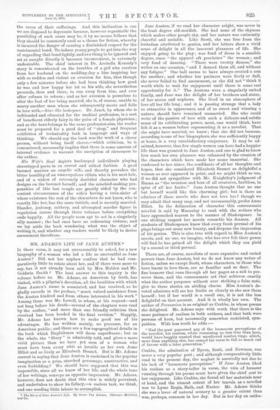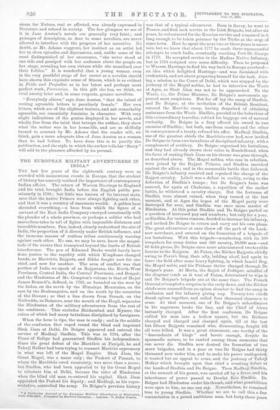MR. ADAMS'S LIFE OF JANE AUSTEN.* Is there room, it
may not unreasonably be asked, for a new biography of a woman who led a life so uneventful as Jane Austen? Did not her nephew confess that he had com- paratively little to relate about her, and if there were more to say, has it not already been said by Mrs. Malden and Mr. Goldwin Smith P The best answer to this inquiry is the volume before us. Mr. Adams, an American by birth, has visited, with a pilgrim's devotion, all the localities with which Jane Austen's name is associated, and has received, as he gladly records in the preface, "much valued assistance from the Austen kindred and from others interested in his work." Among these was Mr. Lowell, to whom, at his request—and not long before his death—several of the chapters were read by the author, "and more than one friendly criticism then received has been heeded in the final revision." Happily, Mr. Adams has known how to make good use of his advantages. He has written mainly, we presume, for an American public; and there are a few topographical details in the book which Englishmen will deem superfluous ; but on the whole, the "Story" is admirably told, and gives a more vivid picture than we have yet seen of a woman who must have been every whit as lovable as her own Anne Elliot and as lively as Elizabeth Bennet. But is Mr. Adams correct in saying that Jane Austen is enshrined in the popular imagination as a prim, starched personage, unattractive, and even forbidding ? We should have supposed that this was impossible, since all we know of her life, and the whole tone of her writings, conveys an opposite impression. Mr. Adams, however, does not doubt that this view is widely prevalent, and undertakes to show its fallacy,--a useless task, we think, and one needing little labour to accomplish.
• The Story of Jane Austen's Life. By Oscar ray Adams. Chicago : McClurg and Co.
Jane Austen, if we read her character aright, was never in the least degree old-maidish. She had none of the shyness which makes other people shy, and her nature was eminently cheerful and sociable. Like Scott, she was free from the irritation attributed to genius, and her letters show a vivid sense of delight in all the innocent pleasures of life. She enjoyed going to the play; was fond of dress in a sensible degree, since "the apparel oft proclaims" the woman ; and very fond of dancing. "There were twenty dances," she writes on one occasion, "and I danced them all, and without any fatigue." One ball seems to have always created a zest for another; and whether her partners were lively or dull, she never failed to find amusement, as she did not "think it worth while to wait for enjoyment until there is some real opportunity for it." The Austens were a singularly united family, and Jane was the delight of her brothers and sister, of her nieces and nephews. She lived in an atmosphere of love all her life long ; and it is passing strange that a lady so attractive in appearance, and of so sweet and winning a nature, should have remained unmarried. She who could write of the passion of love with such a delicate and subtle sense of its exhilarating power, must, one would think, have felt it as a woman before representing it as a novelist. That she might have married, we know ; that she did not because, according to one of her biographers, she was sufficiently happy at home, is a very unsatisfactory conjecture. It may be ad- mitted, however, that few single women can have had a happier life than was granted to Jane Austen, and one is glad to know how much her own pleasure was enhanced by the creation of the characters which have made her name immortal. She confessed to her sister, the confidante of all her thoughts and hopes, that she considered Elizabeth Bennet as delightful a woman as ever appeared in print, and we might think so too, if we did not sympathise with Mr. Knightley's judgment of Emma as "the sweetest and best of all creatures, faultless, in spite of all her faults." Jane Austen thought that no one but herself would like this charming girl ; but is there an admirer of these novels who does not love her? though we may admit that many may, and not unreasonably, prefer Anne Elliot. In the delineation of character this consummate novelist is said by Macaulay to rank with the writers who have approached nearest to the manner of Shakespeare. In one striking respect her novels resemble his dramas. All students of Shakespeare know that every fresh perusal of his plays brings out some new beauty, and deepens the impression of his genius. This is also true with regard to Miss Austen's novels, and no one, we imagine, who has ever felt their power will find he has gained all the delight which they can yield by a second or third perusal.
There are, of course, novelists of more expansive and varied powers than Jane Austen, but we do not know any writer of fiction, unless we except Scott, whose characters, to those who have learnt to love them, are so familiar and so dear. The fine humour that runs through all her pages as a salt to pre- serve them, and the consummate art that achieves exactly what the author purposes without ever striking a false note, give to these stories an abiding charm. Miss Austen's de- voted admirers will see her limits as clearly as she saw them herself ; but if her world is a small one, it is not the less delightful on that account. And it is wholly her own. The author of Persuasion is as original as Crabbe, in whose poems she delighted. Mr. Adams says with truth that there is the same patience of realism in both authors, and that both were persons of keen, but necessarily somewhat restricted, sym- pathies. With less truth he adds :— "Had the poet possessed any of the humorous perceptions of the novelist, his realism, while remaining no less true than hers, would have happily wanted that unrelieved sombre tinge which, more than anything else, has caused his verse to fall so much out of favour with a later generation."
Crabbe, the admiration of Byron, Scott, and Newman, was never a very popular poet ; and although comparatively little read in the present day, the neglect is assuredly not due to his lack of "humorous perceptions." If Jane Austen liked his realism as a story-teller in verse, the vein of humour running through his poems must have given the chief zest to her enjoyment. Like Crabbe, she found all her materials near at hand, and the utmost extent of her travels as a novelist was to Lyme Regis, Bath, and Exeter. Mr. Adams thinks she was a lover of natural scenery to a greater extent than was, perhaps, common in her day. But in her day an enthu- siasm for Nature, real or affected, was already expressed in literature and echoed in society. The few glimpses we see of it in Jane Austen's novels ;we generally very faint ; and passages of description, so dear to some novelists, are never allowed to interfere with the progress of her narrative. No doubt, as Mr. Adams suggests, her instinct as an artist led her to shun episodes and digressions, and, unlike some of the most distinguished of her successors, "she never stood at one side and gossiped with her audience about the people on her stage, revealing her own virtues while she moralised over their foibles." It is wonderful that a young woman even in the very youthful stage of her career as a novelist should have shown this exquisite sense of fitness, which is as evident in Pride and Prejudice as in her latest and perhaps most perfect work, Persuasion. In this gift she has, we think, no rival among later and, in some respects, greater novelists.
"Everybody allows," says Jane Austen, "that the talent of writing agreeable letters is peculiarly female." Her own letters, which are of the slightest texture, and not remarkably agreeable, are essentially feminine in character. With very slight indications of the genius displayed in her novels, and wholly free from the taint that betrays the author, they show what the writer was in her home-life, and are so skilfully turned to account by Mr. Adams that the reader will, we think, gain a more adequate idea of Jane Austen as a woman than he had before. To have done this is to justify the publication, and the style in which the author tells his " Story " will add to the pleasure afforded by its perusal.



















































 Previous page
Previous page